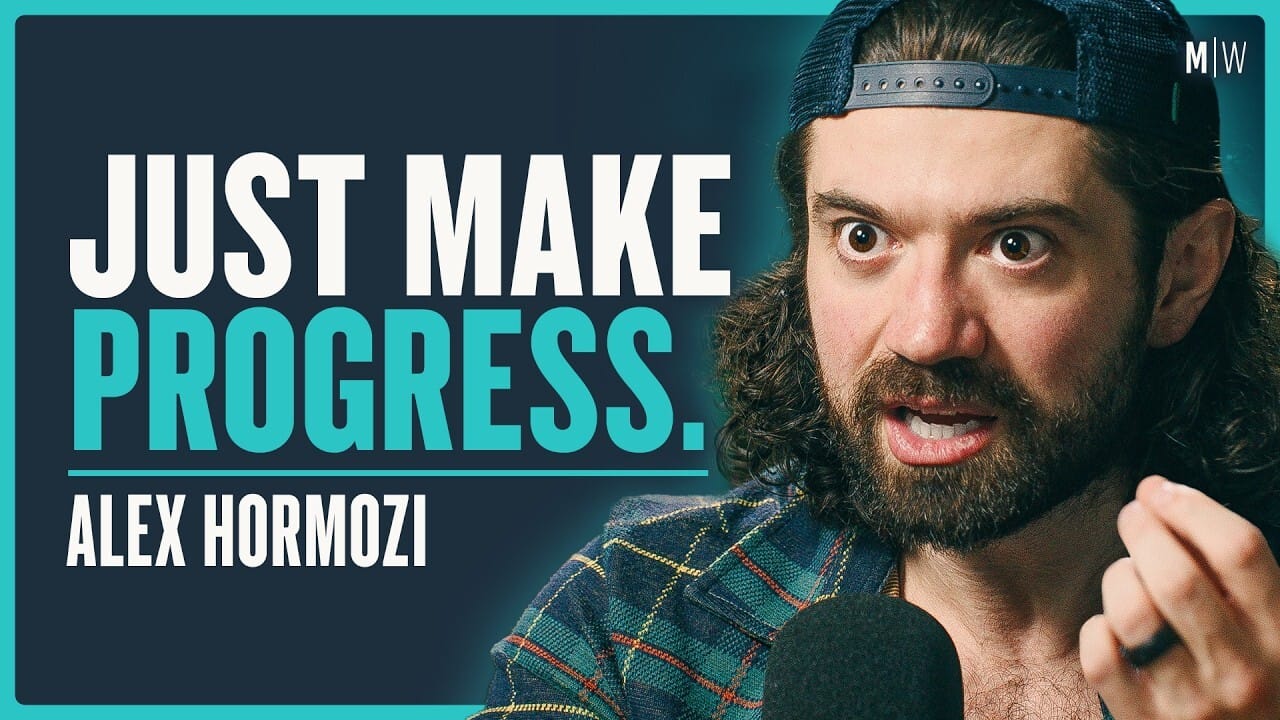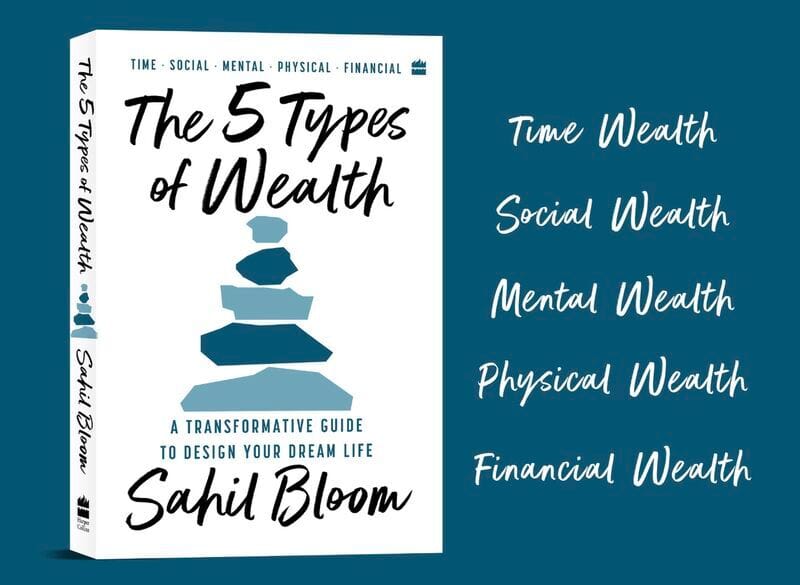
Volume 071
“Don’t hope for better. Just be better. Be something better. Be more compassionate, more resilient, more humble, more disciplined.” - Mark Manson
Alex Hormozi and Chris Williamson got together again this week for the fourth installment of the “__ Harsh Truths Nobody Wants to Admit.” The first ever volume of The Superset highlighted the first of these episodes, and their takeaways have become a mainstay of the newsletter.
This episode was particularly fascinating, because Alex Hormozi - a self-admitted hardo when it comes to work, and grind, and discipline - had some life things happen this year that have clearly challenged his outlook on life. It’s fun to listen to the evolution of his thought process.
The link to the latest episode is here (41 Harsh Truth Nobody Wants to Admit), and it is also the feature of today’s Brain section. I loved this analogy from the podcast, and wanted to utilize it for today’s intro:
Chris and Hormozi dive into a powerful analogy that reframes how we approach building our lives, and choosing our partners. Picture this: you move into an unfurnished house. Finding the right lamp? Easy. Any lamp will do because the house fits around it. But imagine you've spent years meticulously designing your home, from the furniture to the artwork to the fragrance in the air. Now, finding a lamp that perfectly complements all of that? Nearly impossible.
Hormozi uses this metaphor to highlight a broader truth: the order we choose matters. Whether you're building a relationship, career, or personal routine, starting with an anchor - like a partner, job, or core value - and then constructing everything around it makes life far more intentional and harmonious.
This isn’t just relationship advice, it’s a framework for purposeful living. By choosing your “lamp” early, you design everything around it instead of squeezing your life to fit around something that doesn’t really belong.
Superset of the Week:
Brain - Don’t Let a Bad Season Become Your Story

The structure of these Modern Wisdom podcasts with Alex Hormozi revolve around this: Hormozi posts quick-hitting insights on social media every day of the year. Over time, Chris and his team accumulate a list of them that they then take to the podcast to discuss in further details.
As mentioned in the intro, Alex Hormozi’s personality can be a little brash to some. To the point where I wouldn’t have blamed people for being turned off by his outlook. This is why I enjoyed this episode so much, and wanted to pull my favorite section out below. Hormozi has clearly had some things (which he discusses in the podcast) happen in real life that have forced him to challenge the way he thinks about life and work.
The podcast is four hours long, but this quote and discussion happens pretty early on in the podcast. Hormozi says the following:
“Most people don’t have bad years. They have 5 bad moments… that they relive 500 times.”
Sit with that one for a second.
We’ve all done it, probably even recently. We let one failed interview, a rough conversation, a missed opportunity, or a mistake on a Tuesday spiral into the narrative for our entire month, or worse, our year.
Hormozi (from recent experiences he describes - wife’s health, lawsuits, rupturing his quad) frames it differently: stop seeing your life in terms of “good years” or “bad years.” Life happens in seasons. There will be winters, periods where things feel cold, slow, uncertain. But that’s not your whole life. That’s a chapter. It’s a stretch of time that demands resilience, not retreat.
When we internalize temporary pain as permanent identity, we lose momentum. We freeze. And we start telling stories like “I’m just not having a good year” or “everything is off right now.” That language becomes a self-fulfilling prophecy.
But what if you just had a rough season? What if this week was just… a tough one? Not defining. Just difficult.
This reframing doesn’t ignore struggle, it gives it context. It reminds you that rough patches are expected. They’re part of the rhythm, not a reason to stop.
The mindset shift is this:
A bad meeting doesn’t make a bad job.
A rough day doesn’t make a rough life.
An argument doesn’t make a bad relationship
A bad season doesn’t mean you’re off track, it means you’re in process.
You don’t need to be at your best all the time. You just need to keep showing up, especially when things aren’t ideal.
This week, if you’ve been holding onto one of those moments—something that didn’t go your way—ask yourself: Is this a defining story or just a hard chapter? If it’s the latter, close the book on it and start a new page.
You don’t need to be perfect. You just need to not quit. Don’t let a few bad days turn into a narrative in your head that cause you to blink and look back and realize you turned those few bad days into a bad year.
Body - 10 Ways to Stay on Track and Enjoy Your Vacation

Summer is here, the 4th is around the corner, and the time of year for family trips is in full swing. Vacations are meant to recharge you, not derail you. But it’s easy to swing too far in either direction: all-or-nothing mindsets like “I’m either totally off or totally on” usually lead to guilt, overindulgence, or missed moments. I have had to learn the hard way over time on both sides of this token.
Your number one goal on vacation should be to enjoy the trip, the memories, and the experience. Always default into leaning into that. There’s nothing more defeating though then feeling like you completely lost the plot on your fitness goals as you return, supposedly feeling “recharged". Here are 10 low-stress, high-impact ways to stay on track while fully enjoying your trip this summer:
Front-Load Movement
Start your day with a short run, a hotel gym session, or even a 20-minute walk. Movement first thing resets your physiology and mindset. After that? You’re free to enjoy the rest of the day with less guilt.
Use the “One Rule” System
Set one non-negotiable: protein at every meal, 10k steps per day, or a minimum water intake. One rule keeps structure without overwhelming you.
Eat Like a Local, Not a Lunatic
Try everything! But do it mindfully. Slow down, eat to taste, not to finish. Savor local flavors - you don’t need to eat everything on every plate.
Use the 80/20 Meal Rule
Make 2 out of 3 meals each day “supportive”: higher in protein, veggies, and hydration. Then let the third meal be whatever you truly want. You won’t feel deprived or out of control.
Prioritize Protein Early
Protein first at breakfast sets the tone. It’ll help with satiety all day and reduce cravings when that gelato stand hits your line of sight.
Hydration = Energy Control
Travel = dehydration. Dehydration = low energy and increased hunger. Carry a bottle, drink before every meal, and hydrate before booze.
Walk Everywhere You Can
Walking is the most underrated metabolism booster. Skip the Uber when possible. Explore on foot. 10,000 steps/day can offset a lot of indulgence.
Think “Maintenance Mode,” Not Progress Mode
You’re not trying to hit new PRs. You’re trying to feel good, stay connected to your routine, and return without a reset. That’s the win.
Don’t Let One Meal Spiral Into a Week
Had a big dinner? Cool. Don’t “start over Monday.” Reset with water, movement, and something light the next morning. That is the discipline.
Enjoy Guilt-Free
Vacation is meant to be enjoyed. You’re not a robot. Relax, indulge in what brings joy, and trust that you’re capable of returning to structure without punishment.
It’s not about being perfect. It’s about being present, and that means taking care of your body without obsessing over it. Vacation can be both a release and a reset if you approach it with intention.
Book - A Revisit to The 5 Types of Wealth

I made a commitment to myself that when I finished “5 Types of Wealth” by Sahil Bloom that I would purposefully revisit it often to reinforce the ideas. It is one of those books that just makes sense, and is easy to take action on. I am also at a point in my life where these considerations really matter - as many of you are too.
How do I make the decision on where to go with my career? What is the proper balance for saving for the future and enjoying the now? How do I navigate my adult friendships and balancing those with family time? Etc.
The section that challenged my thought process the most was “Time Wealth.” In The 5 Types of Wealth, Sahil Bloom lays out a powerful framework that challenges the narrow view of wealth as purely financial.
Sahil says: “Time wealth is the freedom to spend your time doing what you want, when you want, with whom you want.”
Most of us treat time like it’s infinite and money like it’s scarce. But it’s the opposite. You can always earn more money. You cannot earn more time. Yet we often trade our time away - mindlessly, habitually, and without thinking about the long-term cost.
Sahil makes the point that you’re not truly rich if your calendar is always full with things you didn’t choose. And while the idea might feel idealistic for those of us with demanding careers, families, or side hustles, it’s also deeply practical. You don’t need to overhaul your life overnight. You just need to start asking one question more often:
“Is this how I want to spend my time?”
Time wealth is built through boundaries. Saying “no” more. Delegating when possible. Scheduling time for the things that refuel you: walks with your partner, workouts, quiet reading, unstructured mornings. Even one reclaimed hour a day is a compounding asset.
Personally, I am challenging myself to be more intentional with this thought process for everything in my life - career advancement, social events, commitments, etc: Does this align with the life I’m building, or is this just a reflexive yes? That little pause creates room for better decisions.
Sahil’s broader thesis is that a truly rich life is built across all five dimensions: Financial, Time, Physical, Social, and Mental Wealth. But Time Wealth, I believe, is the key that unlocks the rest.
This week, audit your calendar. Circle one block of time you can reclaim, and protect it like your most valuable investment. Because it is.
Breakthrough of the Week - Cold Plunge Sale
Allison got me one of these IcePod cold plunges a few years back, and it is a really great setup for the money for anyone looking to get into cold plunging.
They have regular options that require you to fill with ice (what we have), as well as options that come with a self-chiller for the water (what I would like). If you have been looking to get a cold plunge, their Father’s Day sales are pretty sharp right now. Here is the link: PodCompany Ice Pod